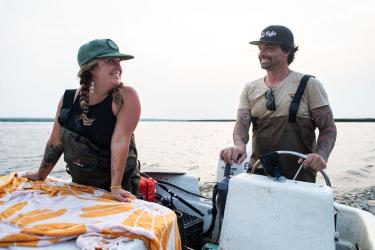Amy Martins is based out of our Woods Hole (MA) Lab and is the chief of our Fisheries Sampling Branch. At the moment, she is the acting chief for the Fisheries Monitoring and Research Division, which includes her branch as well as the Northeast Cooperative Research Program. Amy has been with NOAA Fisheries since 1991, starting her career as fishery observer on fishing and research vessels.
What got you interested in science?

My interest in science started when I was a young child and continued through my college years. I was a bit of an outdoor dreamer and a voracious reader. I read National Geographic magazines, encyclopedias and field guides – memorizing characteristics, Latin names, population estimates, behaviors, adaptations, etc. My family camped and fished when I was growing up and I loved wandering in the woods, exploring along shorelines, and observing how things worked. I cherished time with my grandfather, hunting for night crawlers, fly fishing, ice fishing, deep-sea fishing, and just bobbing for sunfish in a local pond. I’ve always liked fishing, and I have a great appreciation of the culture of fishing. While working on a recreational fishing boat out of Long Beach Island in New Jersey, I loved getting the fishing poles ready, recording sightings of birds and whales, and identifying the day’s catch. I discovered that I was drawn to how humans use and impact natural resources, and how we might conserve and preserve (both resources and culture) through informed and responsible harvesting practices.
When did you know you were going to be a scientist?
There really wasn’t a single moment – it was more like a series of moments. I recall being impassioned by the work of Jane Goodall and Dian Fossey. These women were my heroines – they were strong, worked in harsh conditions and believed passionately in their work protecting and learning from primates. When I was fifteen, I was awarded a Rotary scholarship to spend a year in a country of my choice. Of course I picked a country in Africa, just like my heroines! Besides observing and photographing wildlife and writing poetry, I had a glimpse at a socialistic government and saw how limited resources led to rations – water had to be conserved, and bread lines were long with the limited flour and sugar. I was conflicted by being in this amazing environment so rich with diversity yet ravaged by political instability. With the end of high school nearing, I had to make a decision – art or science. Although I love art, I chose science in hopes of contributing to the body of knowledge and process that is science - I really wanted to make a difference through environmental research and education.
What accomplishment is your proudest so far?

Wasn’t that just the best feeling when you are a kid, to have someone tell you that they are proud of you?! But it’s rare that we ask ourselves this question. I am very proud of the work that the observer programs do to collect data on commercial fishing boats around the world. We strive to not only improve the value of the data, but also the safety of observers. I am proud to have worked in observer programs for over 26 years, on boats in the Northwest Atlantic, and off Antarctica and Alaska and am proud to now manage the Observer Programs in the Northeast and mid-Atlantic. Observers work on commercial fishing boats to collect scientific data on what was caught, including collecting biological samples and environmental data. This data helps inform stock assessments, reduce unwanted bycatch, and ensure ecosystem health. Finally, another accomplishment I’m most proud of is my family, especially my two daughters who are kind, passionate, and environmentally and culturally aware.
What advice would you give young aspiring female scientists about a career in science?
Keep your options open by opening doors for yourself. Like a NASCAR race, join in but just keep on track – there will always be risks with being too fast, too slow, or just in the wrong place at the wrong time. Don’t be deterred by mistakes, injustices or setbacks because they will happen. Instead, learn from them and make yourself better. Stay positive and surround yourself with positive supporters and good role models. Stay humble and don’t forget your roots. Never apologize for who you are, but be sure to apologize when you make a mistake. And always be thankful for the opportunities that come your way. Remember to think through options - practice, and be prepared. Adapt to evolving technology. There are always innovative tools being developed that can help to advance science. Most importantly, seek your passion that you can invest in fully, with your heart and mind.
To learn more please contact Heather Soulen.
